Unit 8 Money Matters
新21世纪大学英语课文第八单元textA的翻译
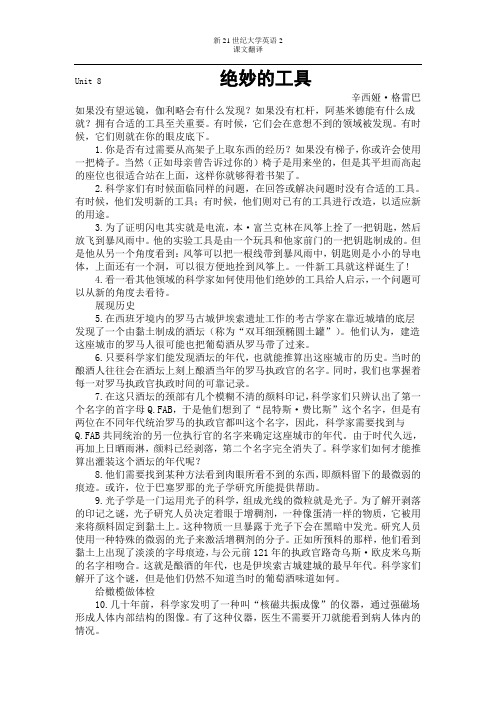
Unit 8 绝妙的工具辛西娅·格雷巴如果没有望远镜,伽利略会有什么发现?如果没有杠杆,阿基米德能有什么成就?拥有合适的工具至关重要。
有时候,它们会在意想不到的领域被发现。
有时候,它们则就在你的眼皮底下。
1.你是否有过需要从高架子上取东西的经历?如果没有梯子,你或许会使用一把椅子。
当然(正如母亲曾告诉过你的)椅子是用来坐的,但是其平坦而高起的座位也很适合站在上面,这样你就够得着书架了。
2.科学家们有时候面临同样的问题,在回答或解决问题时没有合适的工具。
有时候,他们发明新的工具;有时候,他们则对已有的工具进行改造,以适应新的用途。
3.为了证明闪电其实就是电流,本·富兰克林在风筝上拴了一把钥匙,然后放飞到暴风雨中。
他的实验工具是由一个玩具和他家前门的一把钥匙制成的。
但是他从另一个角度看到:风筝可以把一根线带到暴风雨中,钥匙则是小小的导电体,上面还有一个洞,可以很方便地拴到风筝上。
一件新工具就这样诞生了!4.看一看其他领域的科学家如何使用他们绝妙的工具给人启示,一个问题可以从新的角度去看待。
展现历史5.在西班牙境内的罗马古城伊埃索遗址工作的考古学家在靠近城墙的底层发现了一个由黏土制成的酒坛(称为“双耳细颈椭圆土罐”)。
他们认为,建造这座城市的罗马人很可能也把葡萄酒从罗马带了过来。
6.只要科学家们能发现酒坛的年代,也就能推算出这座城市的历史。
当时的酿酒人往往会在酒坛上刻上酿酒当年的罗马执政官的名字。
同时,我们也掌握着每一对罗马执政官执政时间的可靠记录。
7.在这只酒坛的颈部有几个模糊不清的颜料印记,科学家们只辨认出了第一个名字的首字母Q.FAB,于是他们想到了“昆特斯·费比斯”这个名字,但是有两位在不同年代统治罗马的执政官都叫这个名字,因此,科学家需要找到与Q.FAB共同统治的另一位执行官的名字来确定这座城市的年代。
由于时代久远,再加上日晒雨淋,颜料已经剥落,第二个名字完全消失了。
B2U8 Moneyppt课件
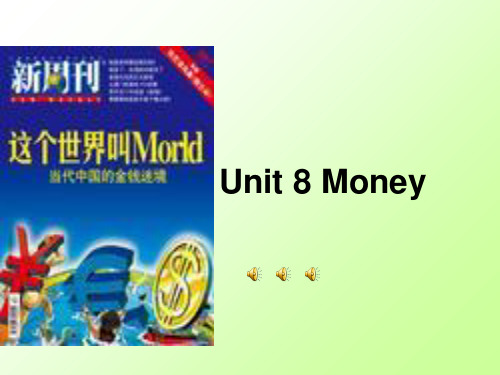
Task 2
Do you know the history of money?
By the help of the picture below, can you describe the development of money?
shells
copper money in the shape of knives, jade and spinning wheels
Task 1
• My form delights every eye, • And no one can my worth deny; • Whatever my color I am of use, • Though subject often to much
abuse; • The cause of anguish and of joy, • For most will smile when I am by.
contributing old-fashioned confirm consume spin aspire hoard rare breed inventor net patent depart
penniless approach amass govern philosophy evil pray ewe lamb harmony elusive pantry thirst panic
During the 600s B.C., people in the ancient kingdom of Lydia began using coins. The coins had a lion’s head stamped on them to show that the king of Lydia had given then a guaranteed value. Traders soon found that coins were easier to handle than goods and lasted a long time. Later, other countries began to make their own coins.
新视野视听说(第三版)第1册第3单元 Book 3 Unit8 Money Matters

hat ✔ shoes ✔ coat ✔ sunglasses ✔ tops ✔ skirts
watch ✔ telephone
Listening to the world
5 Writing down your shopping habits using the prompts below. I 1) l_i_ke__ shopping because 2) s_h_o_p_p_i_n_g_m__ak_e_s__m_e_h_a_p_p_y__. I usually shop 3) __a_t _a_s_h_o_p_p_i_n_g_m_a_l_l_b_e_c_a_u_s_e_t_h_er_e__a_re___ m__a_n_y_d_i_ff_e_r_en_t__ki_n_d_s_o_f_s_t_o_re_s_. Recently, I have bought 4)_a_d_i_g_it_a_l_c_a_m_e_r_a____. / I 1)___d_o_n_’_t _li_k_e_______ shopping very much because 2)__i_t’_s_v_e_ry__ti_r_in_g__a_n_d_____ __t_im__e_-c_o_n_s_u_m__in_g_.I usually shop 3)__o_n_l_in_e__b_ec_a_u_s_e__it___ _sa_v_e_s_a__lo_t_o_f_t_i_m_e___Recently, I have bought 4) _a_p_a_i_r _o_f _s_n_e_a_ke_r_s__.
Listening to the world
WHILE you listen
Listening to the world
新视野视听说(第三版)第1册第3单元 Book 3 Unit8 Money Matters

Listening to the world
3 Watch Part 2 and circle the correct answer.
E
D
5: He buy things in __s_m_a_l_l_in_d_e_p_e_n_d_e_n_t_s_h_o_p_s____. 6: She likes to find rare things in _vi_n_t_a_g_e_s_h_o_p_s______.
Listening to the world
WHILE you listen
4 Note down the ideas and some details.
Money-
Details
making ideas
The mobile phone
•1908: the first telephone that could be carried around •1973: the modern mobile phone was invented by Martin Cooper •1980s: “mobiles” became popular •many countries e.g. the UK, now have more mobile phones than people
Listening to the world
Listening skills
Additional Tips
Note-taking: using a table to organize notes
Listen to the paragraph, which is the beginning of a lecture and write down the main points in the table.
2020-2021学年人教版八年级下册英语Unit 8知识点汇总

人教版八年级下册Unit 8知识点Unit 8 Have you read Treasure Island yet?第一课时Section A(1a-2d)重点单词treasure n.珠宝;财富island n.岛page n.页,面,张hurry v.匆忙;赶快重点短语full of 满是……的;(有)大量的;(有)丰富的write about 写关于……的内容put down 放下;写下hurry up 赶快;急忙(做某事)重点句子1.Have you read Little Women yet?你读过《小妇人》吗?2.Oliver Twist is about a boy who goes out to sea and finds an island full of treasures.《雾都孤儿》讲的是一个男孩出海,发现了一座满是金银财宝的岛屿。
3.Robinson Crusoe is a classic.《鲁滨逊漂流记》是一部经典著作。
4.It’s about four sisters growing up.它讲的是四姐妹的成长故事。
5.It was really good,so I couldn’t put it down.它真的很不错,所以我根本舍不得放下。
要点点拨It was really good,so I couldn’t put it down.put down放下;写下。
它为动副型短语。
其后接名词作宾语时,名词可放在down之后,也可放在put和down之间;但是接代词作宾语时,代词只能放在put和down之间。
例:Please put it/them down.请把它/它们放下来。
【拓展】与put相关的短语:put away放好,收起来;put on穿上;put up举起,抬起,张贴;put off推迟,拖延;put into把……放进,把……翻译成。
学以致用(1)“你读过《小妇人》吗?”“是的,我读过。
unit 8 Money
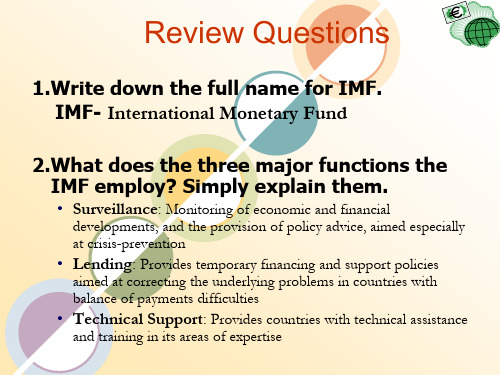
Functions of Money
Medium of exchange/means of exchange Unit of account/standard of value Store of value Standard for deferred payments
Medium of exchange/means of exchange
Credit/fiat money/legal tender
第一套人民币(1元券)
Credit money is the money which does not consist of or represent a specific valuable commodity Tow features
Review Questions
1.Write down the full name for IMF. IMF- International Monetary Fund 2.What does the three major functions the IMF employ? Simply explain them.
• It has no relation with precious metals • It has based on the credit of national governments and banks
Forms of credit money
• Currency (banknotes and coins) • Bank deposits/checking accounts
The Origins of Money
Demand/desire
Barter (Direct Exchange) Individual Difference (talent,character, hobby,etc.) Division of Labor Economy of Exchange Private Ownership Indirect exchange Double Coincidence of Wants Money
大英一视听说U校园答案单元8

Unit 8 Money mattersListening to the world8-2 SharingPracticePractice-1参考:The people in the podcast mainly talk about how they feel about shopping, where they usually shop, and what they have bought recently.Practice-21) D2) C3) A4) E5) B6) FPractice-31) B2) B3) A4) B5) B6) APractice-41) A,D,E,F,G,H,J,L,M,O,PPractice-61) like shopping2) shopping makes me happy3) at a shopping mall because there are many different kinds of stores4) a digital camera5) don't like shopping very much6) it's very tiring and time-consuming7) online because it saves a lot of time8) a pair of sneakers8-3 ListeningUse the skillsUse the skills-11) B2) C3) A4) DUse the skills-21) rubber2) 18913) concentrate4) 19735) mobiles6) light7) 20018) 500,five hundred9) 200,two hundred10) 103,one hundred and threeUse the skills-31) A,E,D,G,F8-4 ViewingGet a clue1) Google is special in that in less than 10 years it has greatly changed the way people use the Internet and it is used by more than 400 million people a month.2) I was impressed most by its founders. Both of them were students, but they became multibillionaires in less than 10 years.View itView it-11) early 30s,early thirties2) 6 billion,six billion3) computer science students4) tour guide5) in the group6) searching the Internet7) 2000,two thousand,2,0008) successful business9) fastest growing10) most profitableView it-21) E,D参考:Presenter;Sergey BrinIt's the fastest growing company in history, used by 400 million people a month. The Internet search engine Google has turned its founders from students to multibillionaires. Tonight, The Money Program does its own research on this extraordinary money-making machine and finds out how it's changed the lives of countless millions of people who now inhabit "the World According to Google".And these are the guys who made it all possible. Google's founders, Larry Page and Sergey Brin, still in their early 30s, and each worth an estimated 6 billion pounds. Theirs is a dramatic tale which began 10 years ago when Larry and Sergey were both brilliant computer science students. The two met on a day out from Sergey's university. Sergey was acting as a tour guide for some prospective students and Larry was in the group. Larry and Sergey developed a piece of software which they believed could revolutionize searching the Internet. Larry and Sergey always believed their system was a winner. Lunchtime hockey in the car park was all part of how Google was gonna be different.It's a revolution, and you know, like the Industrial Revolution.Inside, the office was a playground of lava lamps and bouncy balls. Sergey himself created the Google logo, with its childlike colors, to remind users that Google wanted to be a force for good. In 2000, Larry and Sergey hit the jackpot and turned the corner from successful search engine to successful business. Their secret? A special system of advertising. So how does it work? Well, if you're trying to find out about, say, "Stonehenge", here's what you get. These are ordinary search results and over here is a list of ads. They're from companies who have picked "Stonehenge" as a key word which triggers their ad to appear. They are businesses who all think someone searching for"Stonehenge" might also be interested in them. And that was how a humble student project became the fastest growing and one of the most profitable companies ever.Speaking for communication8-6 Role-playingNote them downNote them down-11) C2) B3) A4) B5) CNote them down-21) B2) A3) B4) B5) A6) B7) A8) A9) B10) A8-7 PresentingGet ideas1) Footballers,footballers2) Fire fighters,fire fighters,Firefighters,firefighters3) Doctors,doctors4) Teachers,teachersOrganize ideas1) B2) C3) A4) E5) D6) F1) doctor2) People need special and extensive training to become doctors.3) They relieve our pain, cure our diseases, and save our lives.4) Their work is indispensable to everyone and they cannot be replaced by anyone else.5) footballer6) Footballers' work is to entertain some people.7) It doesn't add any real value to society.8) They make money simply by playing – it's not real work and it's so easy.More practice in listening8-8 More practice in listeningConversationsShort conversations1. B2. D3. C4. B5. DLong conversation1. B2. C3. A4. DPassagesPassages-11. C2. D3. B4. DPassages-21) evidence2) enhance3) interviewed4) rated5) took into account6) forecast7) emerged8) was related to9) adapt themselves to10) originalNewsNews-11. A2. C3. ANews-21. D2. C3. DMoral education8-9 Lead-inQuiz1.B2.A3.C8-10 World storyViewing and understanding1) A2) B3) A4) A5) BSpeaking1) financial2) funding3) stepping stone4) budgeting5) systematically8-11 China talkListening and understanding1) A2) B3) D4) AUnit test8-14 Unit test短对话1) C. She is going to save it for future use.2) D. He hopes to save up money to help the poor.3) A. To spend it at Christmas.4) B. They don't like to spend money.5) C. He was unable to get enough money.长对话6) C. By working in a factory.7) C. Tired.8) B. By washing dishes for some time.9) D. To graduate as a top student in his class.10) A. Hard work makes everything possible.短文理解11) C. Negative.12) B. The card may be used to run up huge debts.13) D. Unusually high.14) A. They can apply for 10 cards, each with a $5,000 limit.15) C. The credit limit should be in proportion to one's income. 听写填空16) accessible17) opens a checking account18) regularly19) orders20) exchange21) bank account22) return23) interest24) instead of25) valuable。
新编大学英语教案(第二册)_Unit8Money
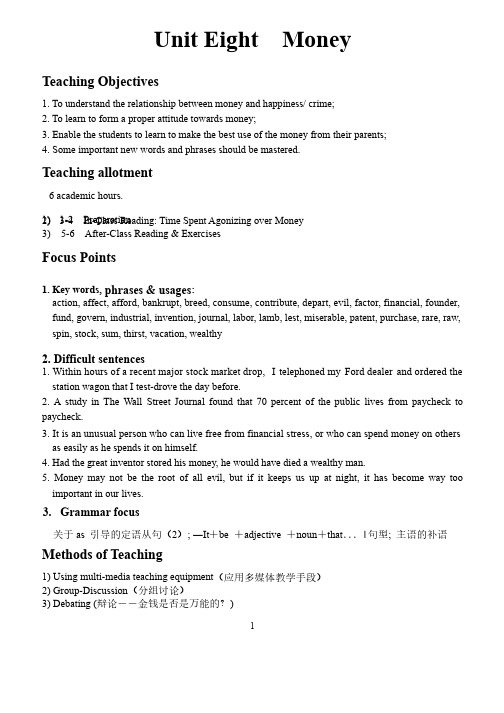
1Unit Eight MoneyTeaching Objectives1. To understand the relationship between money and happiness/ crime;2. To learn to form a proper attitude towards money;3. Enable the students to learn to make the best use of the money from their parents;4. Some important new words and phrases should be mastered.Teaching allotment6 academic hours. 1)1-2 Preparation 2) 3-4 In-Class Reading: Time Spent Agonizing over Money3) 5-6 After-Class Reading & ExercisesFocus Points1. Key words, phrases & usages :action, affect, afford, bankrupt, breed, consume, contribute, depart, evil, factor, financial, founder, fund, govern, industrial, invention, journal, labor, lamb, lest, miserable, patent, purchase, rare, raw, spin, stock, sum, thirst, vacation, wealthy2. Difficult sentences 1. Within hours of a recent major stock market drop, I telephoned my Ford dealer and ordered the station wagon that I test-drove the day before.2. A study in The Wall Street Journal found that 70 percent of the public lives from paycheck to paycheck.3. It is an unusual person who can live free from financial stress, or who can spend money on others as easily as he spends it on himself.4. Had the great inventor stored his money, he would have died a wealthy man.5. Money may not be the root of all evil, but if it keeps us up at night, it has become way too important in our lives.3. Grammar focus关于as 引导的定语从句(2); ; ―It ―It +be +adjective +noun +that ...ǁ句型; 主语的补语主语的补语Methods of Teaching1) Using multi-media teaching equipment (应用多媒体教学手段)(应用多媒体教学手段)2) Group-Discussion (分组讨论)(分组讨论)3) Debating (辩论――金钱是否是万能的?)I. Related Information:Cultural InformationNormally we think of money as the coins and paper notes that are used as a standard medium of exchange or payment within any particular country. Great Britain has the pound, France has the franc, China has the Y uan, and the United States the dollar. But in alltechnologically advanced societies, there are now many different kinds of money. Wealth is not only measured by the amount of coins and paper notes that we possess but also by various types of assets. Aside from, real estate and other forms of material wealth like paintings or jewelry, some people can also own stocks and bonds. The resources of a company are divided into portions or shares that are issued in the form of transferable certificates called stocks. If a company does well, the profits are divided among stockholders. I f a government or a company wants to borrow money, it can issue bonds or certificates of debt that promise to pay back by a certain date the money borrowed plus interest. The risk factor is much higher in stocks. Bonds provide a safer form of investment but they are less profitable. Both stocks and bonds are bought and sold on the stock market.There have always been moral issues related to money. Some societies regarded lavish spending as morally wrong, while others considered lending money at a high rate of interest as a social crime. Many stories have been written on the miser’s greed for money. According to bible, ―the love of money is the root of all evil.ǁ The famous playwright, George Bernard Shaw state that, in the final analysis, it was not the love but the lack of money that was the root of all evil.While it is true that money causes all kinds of problems, it is equally true that in today’s society it is a necessary evil.Key Words Related to the Text1. Bible: The holy book of the Christian, consisting of the Old Testament and New Testament.2. Bernard Shaw(1856-1950): great Irish––born English dramatist, critic and essayist.2. Bernard Shaw(1856-1950): great IrishII. Suggested Class Activities:I. Warming-up Activity: Values on MoneyPurpose: Getting to know the real value of moneyForm: Group discussion and individual statementStep 1; work in pairs to discuss respective views on moneyStep 2: report the results to the class: you way of getting and spending moneyStep 3: concluding remarks given by the teacher making full use of the money you haveSuggested words /expressionsLabor at/spend money as water flows/money makes the world go around Reminds: try to guide the students to develop a right attitude towards moneyII. Activity for further development: Is money the No.1 in your life?Purpose : Teach them to make good use of money Form:Group discussion and individual statementStep 1: Work in groups to discuss what kind of role money plays in your life Step 2:Reports your ideas to the class the importance of money and try to analyze whether money is the most important thing in the world.Step 3: The teacher may put forward the opposite view view——Is money the root of all evils (P.142.3.(2)).Suggested words/expressions:Set a goal/.living style/luxury . What begins as something we want turns into something we need.III. Further development:IV . In-Class ReadingWords and phrases1. affect v . have an influence on (sb or sth ); produce an effect oneffect n . result or influencee.g. Alcohol affect Alcohol affects drivers’ concentr s drivers’ concentr s drivers’ concentration. ation.Alcohol has very bad effect on drivers.2. agonize v . suffer great anxiety or worry intensely (about something); agonize over/about : If you agonize over/ about sth, you spend time anxiously trying to makea decision about it.e.g . She agonized for days about whether she should accept his proposal. We agonized over/about his wound.agony n. extreme mental or physical suffering (a state/feeling of ) extreme physical or mental pain /sufferinge.g. The man injured in the explosion lay screaming in agony.He is in an agony of doubt/ indecision/ suspense.agonized adj. expressing agony 表示痛苦的表示痛苦的e .g . He gave out an agonized cry. (showing extreme physical pain)She gave him an agonized look. (extremely anxious)agonizing adj. causing agony 使人痛苦的使人痛苦的e.g. The sudden pain above his heart was agonizing. (extremely painful)They are faced with an agonizing decision. (causing extremely anxiety)注:此处情况与第7课教案第3处相同,是否需要详细讲解?此处情况与第7课教案第3处相同,是否需要详细讲解?3. amass v.gather together or collect (money, goods, power, information ,etc.) in great amounts, usually over a long period 尤指大量的积累辨析:amass, assemble, accumulate, hoard, compileaccumulate: gradually gather together an increasing number or quantity of sth. 含义与amass 相似,均指长期、大量的积累, 但accumulate 侧重于时间长,amass 侧重于数量大.assemble: bring (parts) together in a single group or place, or (of parts) to come together likethis. 集合,聚集,收集,侧重于把每个部分聚集起来成为一个整体。
B2U8 Money
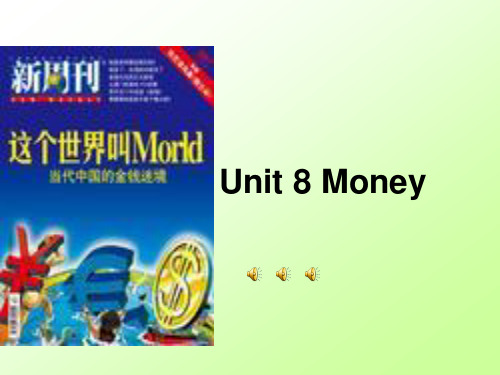
New words (in-class reading)
agonize stock wagon test-drive subtly dealer financial purchase afford journal mortgage bankruptcy all-time
contributing old-fashioned confirm consume spin aspire hoard rare breed inventor net patent depart
When I am absent, small the power To cheer the melancholy hour; Possessing me to some does prove Their life, their soul, the all they love. Others with me can never agree, But quickly give me liberty; Few think of me enough they’ve got, But all can tell when they have not.
Task 2
Do you know the history of money?
By the help of the picture below, can you describe the development of money?
copper money in the shape of knives, jade and spinning wheels
arguments.
For your reference…...
Money Is the Root of All Evil
2020-2021学年高中英语UNIT8单元重点小结课件北师大版必修第三册 181174
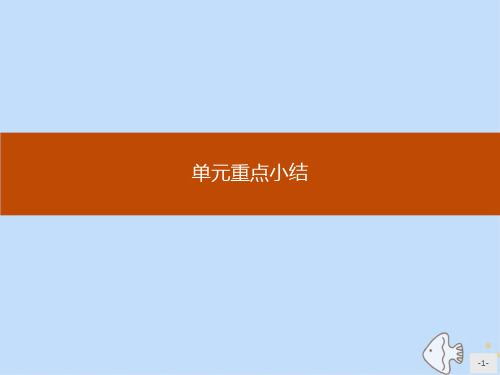
单元重点小结-1-主题语境重点词汇重点句式重点语法人与自然ꢀ环境保护主题语境重点词汇重点句式重点语法1.recycle vt.再利用,回收利用recycled paper再生纸recycling n.回收利用2.balance n.平衡keep a balance between A and B在A和B之间保持平衡keep/lose one’s balance保持/失去平衡a sense of balance平衡感balanced adj.平衡的,均衡的a balanced diet均衡的饮食a balanced life均衡的生活主题语境重点词汇重点句式重点语法3.shoot n.芽,苗;嫩枝ꢀv.射中;射击shoot at sth/sb向……射击shoot sth/sb射中某人/物shoot的过去式,过去分词为shot。
shot除了作为shoot的过去式,过去分词,还可以作为名词,意为“射击,枪声;射门,击球;注射”。
4.bothered adj.担心的;烦恼的hot and bothered忧心忡忡bother v.烦扰;打扰;使不安bother sb with sth为某事打扰或麻烦某人bother about/with sth为某事烦恼bother to do sth费心做某事主题语境重点词汇重点句式重点语法5.foundation n.基础;地基lay the foundation打地基found vt.创立;建立founder n.创办人,创始者6.involve vi.&vt.参与;包含;需要;涉及involve sb doing sth需要某人做某事get/become involved in参与;卷入;与……有关联involve oneself in参与;卷入;与……有关联主题语境重点词汇重点句式重点语法7.profit n.盈利,利润a rise/an increase/a drop/a fall in profits收益的上升/增长/跌落/下降a healthy/good profit获利颇丰make a profit获利net profit纯利润non-profit adj.非营利的for profit为了盈利at a profit有盈利8.contented adj.满意的;满足的content n.内容;目录;所容纳之物;所含之物(多用复数)ꢀadj.满意的be content with对……满意主题语境重点词汇重点句式重点语法9.occur vi.发生;出现occur不用于被动语态;过去式和过去分词为occurred;现在分词为occurring。
B2U8 Money
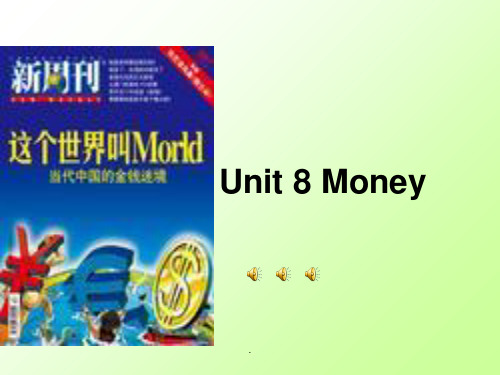
contributing old-fashioned confirm consume spin aspire hoard rare breed inventor net patent depart .
penniless approach amass govern philosophy evil pray ewe lamb harmony elusive pantry thirst panic
account. It also tells you how much interest you have earned.
.
New words (in-class reading)
agonize stock wagon test-drive subtly dealer financial purchase afford journal mortgage bankruptcy all-time
.
Early people used different items as a form of money to “pay” for a product or a service. They included shells, strings of beads, jewels, rice and salt.
The Chinese were the first to use paper money, probably as early as A.D. 1000s. The Italian explorer Marco Polo saw the Chinese using paper money when he visited China in the 1200s. However, it took some time for European countries to see the value of using paper money. They didn.’t start using paper until the 1600s.
高一英语Unit8知识点课件 新课标 人教

1. I came here to attend a meeting.
2. Last Sunday he attended a wedding.
9、静夜四无邻,荒居旧业贫。。*** 10、雨中黄叶树,灯下白头人。。**** 11、以我独沈久,愧君相见频。。***** 12、故人江海别,几度隔山川。。**** 13、乍见翻疑梦,相悲各问年。。***** 14、他乡生白发,旧国见青山。。**** 15、比不了得就不比,得不到的就不要。。。***** 16、行动出成果,工作出财富。。*** 17、做前,能够环视四周;做时,你只能或者最好沿着以脚为起点的射线向前。。**** 9、没有失败,只有暂时停止成功!。*** 10、很多事情努力了未必有结果,但是不努力却什么改变也没有。。**** 11、成功就是日复一日那一点点小小努力的积累。。***** 12、世间成事,不求其绝对圆满,留一份不足,可得无限完美。。**** 13、不知香积寺,数里入云峰。。***** 14、意志坚强的人能把世界放在手中像泥块一样任意揉捏。**** 15、楚塞三湘接,荆门九派通。。。***** 16、少年十五二十时,步行夺得胡马骑。。*** 17、空山新雨后,天气晚来秋。。**** 9、杨柳散和风,青山澹吾虑。。*** 10、阅读一切好书如同和过去最杰出的人谈话。**** 11、越是没有本领的就越加自命不凡。***** 12、越是无能的人,越喜欢挑剔别人的错儿。**** 13、知人者智,自知者明。胜人者有力,自胜者强。***** 14、意志坚强的人能把世界放在手中像泥块一样任意揉捏。**** 15、最具挑战性的挑战莫过于提升自我。。***** 16、业余生活要有意义,不要越轨。*** 17、一个人即使已登上顶峰,也仍要自强不息。****
1. The museum is worth visiting.
Money-Matters谈论价钱
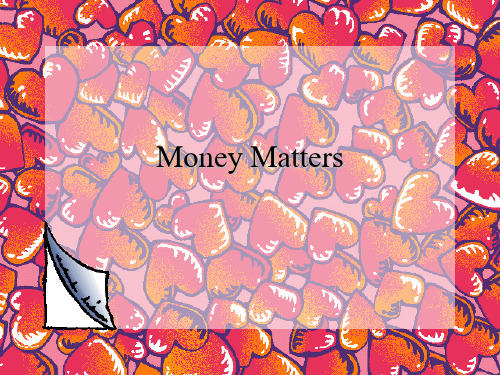
money or lend money? 4. What is more important in a job?
Interesting job or high salary?
5. What do you save money for? Short-term goals or long-term-goals?
How is it? It’s ten yuan(¥10).
much are they? They’re ninety nine dollars and
ninety cents($99.90).
is the water?
are the shoes?
It’s ninety nine point ninety dollars($99.90).
Model Dialogue Two
Jim: What was the last thing you bought? Marilyn: I bought myself a skirt. Jim: Where did you buy it? Marilyn: In a department store. It is green. Jim: It must be very lovely. How much did it
1
2
3
4
3. Depositing money(存钱)
Clerk
Customer
1. Good morning. What 1. Yes, I’d like to open
can I do for you,
an account(账户) and
unit8money

Unit 8 Money Money1、what do you want to do if you have a million dollar?Option1.A million wouldn’t go very far, so I think I would only do a few things. I would buy a modest house and a new car. I would give some of it to my closest family and a couple of friends.Option2. If I have a large sum of money and it's enough, I will certainly do the things below.肆意挥霍,疯狂shopping,买房子买车子买奢侈品,以前买不起的现在都买回来;example: luxury/cosmetics/cars/clothes/camera/……I certainly wouldn’t spend it all on clothes and electronics(或者其他很爱的东西).I would also……I think I may buy a few things that I really want, but wouldn’t go crazy. I will certainly do……环游世界;I would travel to countries that I’ve always wanted to visit, like US, Mexico, Australia, Ibiza. etc.投资以挣更多钱:开公司,投资房地产等等;example: I would make a few investments to earn more money.A million isn’t that wow nowadays, because the price become such a crazy, for instance, it will cost you about a half million to own a moderate apartment in a big city like shanghai or Beijing.辞职,做自己想做的事情,做回自己;example: I would quit my job and go to do something I really love, I would be relaxed because I would not longer need to :play nasty tricks on somebody or lie to survive / worry about my tuition /其他因为money 而不得不做的事情……and I can be myself without any fear.分一些给家人让他们衣食无忧,帮助朋友;example: first, I will use the money to improve my parents'life. They have devoted all their life to give me good education, good clothes and whatever I want. I really appreciate them. Then, I would like to use some of the money to help my friends whose lives are unfortunate.慈善事业:帮助他人,资助贫困学生,收养儿童,捐款给十字会、希望工程等等example:The people who are at a loss, I would help them through the tough times, the poor students who can’t afford tuition, I would support them to complete their studies and I would adopt children and we would live in a big, comfortable house.First,I will give some to the national charities, such as China Charity and RedCross Charity.As you know, there are tens of thousands of' refugees in the Y angtze flooding area and they are suffering from the bad living condition for most of them are homeless. Though some of them have gone back to their own houses, which luckily weren't damaged, there are still lots of problems they have to face.From above, I think that the refugees need money badly either to rebuild their houses or for their destroyed fields. However,many problems can be solved if the charities have enough money to offer them.Furthermore, I will give a lot to the "Hope Project" in order to help the children, especially in the countryside, who can't go to school only because of the lack of money.以上随意组合2、will more happy bring more happiness?正方观点:yesThe importance of money: First of all, we want to say that, without money, we can’t do anything at all. Because in our daily lives, work and study, we have to keep in touch with the society, we have to exchange the daily necessary with other people, money is a medium, therefore, with money, we can get what we want, without it, we can’t get it.例子:I used to know a father, he is quite disappointed about himself, because his salary can’t provide a good living environment for his son, as time passes, even he want to buy something for his son, there is only one response:”it’s too expensive, dad! Our family is poor. We should save money”反方观点:noBut money is not a panacea, for example, some people is in pursuit of money for all his life, and lost himself in the pursuit, lost the ability to enjoy the family happiness and love. In this situation, if you have lots of money, but you are absolutely not happy, for the feeling of love can’t be bought by money. So m oney is not a panacea.No pains, no gains. We may have to sacrifice our family time, our love, our health, our friendship, even our conscience in pursuit of money, however all these can not be bought by money.例子:After won a 10million dollar lottery prize, a Canadian man started his crazy spending, he began to drug and alcohol abuse under the influence of new bad friends, seven years later he spent all the money and ended his own life with a rope. conclusion: The more money you have, the happier you must be. However, depressed debutantes, suicidal CEOs, miserable magnates and other unhappy rich folks aren't the only ones giving the lie to this. We can generally conclude that wealth increases human happiness when it lifts people out of abject poverty and into the middle class but that it does little to increase happiness thereafter."3、is the money the root of evil?正方观点:钱是万恶之源。
新视野大学英语视第三版听说教程第一册Unit 8 Money matters录音文本
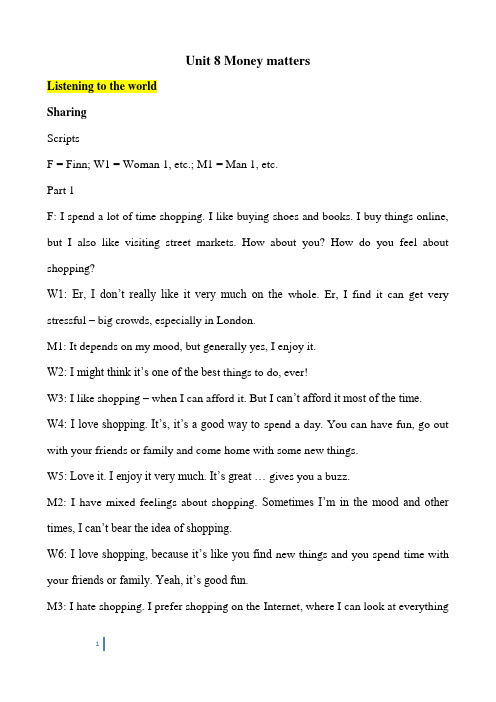
Unit 8 Money mattersListening to the worldSharingScriptsF = Finn; W1 = Woman 1, etc.; M1 = Man 1, etc.Part 1F: I spend a lot of time shopping. I like buying shoes and books. I buy things online, but I also like visiting street markets. How about you? How do you feel about shopping?W1: Er, I don’t really like it very much on the whole. Er, I find it can get very stressful – big crowds, especially in London.M1: It depends on my mood, but generally yes, I enjoy it.W2: I might think it’s one of the bes t things to do, ever!W3: I like shopping – when I can afford it. But I can’t afford it most of the time.W4: I love shopping. It’s, it’s a good way to spend a day. You can have fun, go out with your friends or family and come home with some new things.W5: Love it. I enjoy it very much. It’s great … gives you a buzz.M2: I have mixed feelings about shopping. Sometimes I’m in the mood and other times, I can’t bear the idea of shopping.W6: I love shopping, because it’s like you find new things and you spend time with your friends or family. Yeah, it’s good fun.M3: I hate shopping. I prefer shopping on the Internet, where I can look at everythingand have everything delivered to my house.W7: I love it and I hate it.M4: What do I feel about shopping? I don’t like shopping.Part 2F: Where do you usually shop?W1: For clothes? I guess I like the high street chains. And you find them in lots of places around London.M1: Usually clothes shops, er, independent clothes shops.W2: I’ve been to Harrods. Harrods is really expensive, obviously, but it’s just wonderful to go in there and see what they’ve got on offer and things like that.M3: I shop on eBay. I like eBay because you can find, er, older things or very rare items.W3: Second-hand stores. I like vintage stores and markets, and those sorts of places. W4: If I have the money, I go for the more expensive designers. But usually just midrange.W5: I usually shop in large stores, er … like Selfridges.M2: I try to avoid the big department stores, but I find the small independent shops. W6: I usually shop in high street stores or vintage shops, because in vintage shops, you can find rare things that nobody else has.W7: Because I live in Cape Town, I do most of my shopping in Cape Town, South Africa. But I come to Europe quite often during summer time, so I do my shopping in England, in London or in Italy.Part 3F: Have you bought anything recently?W1: I have actually. Er, I bought a dress and I bought a telephone.M1: Yes, I bought a book – to read on the train.W2: I bought myself a new coat.M5: A pair of trainers that I’m wearing at the moment I bought yesterday. So, that’s the most recent thing I’ve bought.W6: I bought lots of things in the sale, like tops and skirts. And I bought a pair of shoes as well that I had my eye on for a while.M2: Yes, I’ve bought some very cheap trousers in the sales, um, which I’m very pleased about. I bought two pairs because when you find one pair that you like, you should always buy another.W3: I haven’t, no, but my friend Nat alie has.W4: I bought my sunglasses. They’re Chanel, so they’re quite expensive. And that’s today. The other week though, I bought a Mimco handbag which was also fairly expensive but I think it’s very nice.ListeningScriptsWelcome to Money Matters, presented by Jimmy Stevens. Today we’re going to talk about four of the best money-making ideas in history. What do you think this is? It’s a food which you don’t eat.It’s a sweet which is made of rubber. It’s chewinggum! Chewing gum was originally made from chicle, a plant from Central and South America, but now many gum companies use rubber. No one knows who first used chewing gum, but it was in 1891 that Wrigley Company started making and selling it. Many people say it helps them to concentrate, and the US army gives gum to its soldiers for this reason. Today the industry is worth nearly 20 billion dollars a year. On to our next big moneymaker. The first telephone that could be carried around was invented in 1908. In the 1954 film, Sabrina, a character played by actor Humphrey Bogart made a call from the back of his car! But it was in 1973 that the modern mobile phone was invented by an American, Martin Cooper, and in the 1980s “mobiles” started to become popular. Many countries, including the UK, now have more mobile phones than people. Next is the iPod. It’s small and light. It plays and stores music. A company called Apple invented it, but Vinnie Chieco was the man that gave the iPod its name. He saw the machine and thought of a line from the film 2001: A Space Odyssey, “Open the pod bay door, Hal!” The iPod arrived on the market in 2001. In 2007, from January to March, Apple earned 1.8 billion pounds from iPod sales. Our final big moneymaker is all about making money. In 1934 Charles Darrow showed a game to a company called Parker Brothers. Did they want to invest in it? No, they didn’t. So, with a friend who worked in a printing company, Mr. Darrow made 500 copies of the game and started selling them under the name “Monopoly”. The idea of the game is to buy streets where you can build houses and hotels. It soon became popular and Parker Brothers agreed to produce it. Today the owners say they’ve sold over 200 million Monopoly sets and 750 million people haveplayed it. The game is truly international: It’s sold in 103 countries and in 37 languages.ViewingScriptsP = Presenter; SB = Sergey BrinP: It’s the fastest growing company in history, used by 400 million people a month. The Internet search engine Google has turned its founders from students to multibillionaires. Tonight, The Money Program does its own research on this extraordinary moneymaking machine and finds out how it’s changed the lives of countless millions of people who now inhabit “the World According to Google”. And these are the guys who made it all possible. Google’s founders, Larry Page and Sergey Brin, still in their early 30s, and each worth an estimated 6 billion pounds. Theirs is a dramatic tale which began 10 years ago when Larry and Sergey were both brilliant computer science students. The two met on a day out from Sergey’s university. Sergey was acting as a tour guide for some prospective students and Larry was in the group. Larry and Sergey developed a piece of software which they believed could revolutionize searching the Internet. Larry and Sergey always believed their system was a winner. Lunchtime hockey in the car park was all part of how Google was gonna be different.SB: It’s a revolution, and you know, like the Industrial Revolution.P: Inside, the office was a playground of lava lamps and bouncy balls. Sergey himselfcreated the Google logo, with its childlike colors, to remind users that Google wanted to be a force for good. In 2000, Larry and Sergey hit the jackpot and turned the corner from successful search engine to successful business. Their secret? A special system of advertising. So how does it work? Well, if you’re trying to find out about, say, “Stonehenge”,here’s what you get. These are ordinary search results and over here is a list of ads. They’re from companies who have picked “Stonehenge” as a key word which triggers their ad to appear. They are businesses who all think someone searching for “Stonehenge” might also be interested in them. And that was how a humble student project became the fastest growing and one of the most profitable companies ever.Speaking for communicationRole-playScriptsConversation 1S = Shop assistant; W = WomanS: Can I help you?W: No, thanks. I’m just looking.S: OK, just let me know if you need anything.W: Thanks.Conversation 2S = Shop assistant; M = ManS: Hi there. Are you looking for anything in particular?M: Yeah, do you sell those things that soldiers wear? Er, er … it’s like a jacket.S: Um, a type of jacket?M: Er, yeah, a light green jacket with lots of pockets.S: Ah, you mean a flak jacket?M: Er, yes.S: They’re just on your left.M: Ah, yes. Thank you. Can I try this on?S: Of course.M: Where’s the fitting room?S: Just over there.M: Er, thanks.Conversation 3M = Man; S = Shop assistantM: Excuse me. Do you have one of these in a larger size? It doesn’t fit.S: Is that the Large? I’ll just go and check for you. I’m sorry. This is all we’ve got in stock at the moment. There are some other T-shirts over there on the other side. There might be some Extra Large sizes there.Conversation 4W = Woman; S = Shop assistantW: Hello. I was wondering if you’ve got any of that stuff you use for cleaning swimming pools.S: Um … yeah, we usually sell a liquid cleaner.You pour it into the pool. There’s one here.W: Can I have a look?S: Yep.W: How much is it?S: Er, this one’s £28.99 for a liter bottle.Conversation 5S = Shop assistant; M = Man; W = WomanS: Hi. Are you paying by cash or credit card?M: Credit card.S: Can you enter your PIN, please? Thanks. Here’s your card.M: Thanks.S: Thank you. Who’s next, please?W: Do you take Mastercard?S: Yes, that’s fine. Um, can you just sign here, please?Group discussionScriptsA: Personally, I think these footballers earn too much money. They’re 20 years old and they’re already millionaires. I think it’s crazy.B: I agree. They earn enough money in one week to buy a house, a car – anything. Now if you look at, say, fire fighters, who risk their lives …A: Fire fighters don’t earn enough.B: They don’t earn enough.A: What about doctors? Certainly in Britain they work very hard.B: They work too hard. One of my friends is a doctor and he sometimes does 18 hour shifts.A: Ha, that’s crazy.B: Eighteen hours without a break. Again, they’re saving people’s lives.A: Teachers, too. I think they should get much bigger salaries. They also work really long hours.B: Yeah, although they do get good holidays.A: Yeah. That’s true.B: Actually, I think they get too many holidays. There’s Christmas and half term and Easter and the summer. What is it in the summer – about six weeks?A: Yeah, but I think teachers need it ’cause of all the stress.Further practice in listeningShort conversationsScriptsConversation 1M: According to this policy, you can get more welfare money if you have children. W: Sure, I could. But having children would also cost a lot of money, so I doubt the welfare benefits will encourage people to give birth. Besides, I’m happier by myself.Q: What does the woman think about the policy?Conversation 2W: In a marriage, do you think one person should handle money, or both?M: I think it’s easier for one person to deal with money. Take my parents for example. My dad had some pocket money and the rest of his salary went into the bank for my mom to pay the bills with. It never failed once.Q: According to the man, how should a family deal with money?Conversation 3M: My sister is having trouble with her boyfriend. He wants her to sign an agreement on money problems before they get married.W: I can see why. Well, I wouldn’t have married you if you had asked me to sign such an agreement. My parents would have gone mad.Q: What is the relationship between the two speakers?Conversation 4W: How can you afford such nice things on your salary? Something must be going on here.M: OK, I’ll be honest with you, but you can’t tell anyone else. I’ve been burning the midnight oil for another company. They pay me very good money.Q: What can we learn about the man?Conversation 5M: I’d like to buy a new car, but this model is too expensive.W: How about loaning some money from your uncle? It’s better than borrowingmoney from the bank because you will have to pay higher interest to the bank.Q: What does the woman suggest the man do?Long conversationScriptsM: That’s a beautiful new co at, Jessica. Is that real leather?W: Yes, it is! I found it in a sale last week for only $180. I just couldn’t resist!M: $180?! How can you afford that kind of purchase as a college student? Back when I was beginning college, it was a struggle to afford tuition, books and food!W: No problem! My student loan just came in for this term, so I have plenty of money to spend! I took all of my friends out for dinner last night, and tonight we’re going out to a concert! We got great tickets for $75! You should come with us, Mike! M: Thanks for the invitation … Um. I’ll have to pass. I need to prepare for my class. Jessica … $75! You’d better learn to be more careful with your money. What will you do if you run out of money before the end of the term?W: I’ll just call my mom! She loves to send me money. She saved up for college for me from when I was young. She said I should really enjoy my college life! So, I am! M: OK, well, I’ve got to go. Jessica, I may be an old family friend of over 15 years, but here at the university, I’m the graduate teaching assistant in your freshman biology class. So, don’t forget to study for the exam this Thursday!W: OK! Bye!Passage 1ScriptsNo one wants to work on a major holiday like Christmas or New Year’s Eve. But many small businesses choose to remain open during holidays to compete with the big stores and not miss out on money-making opportunities. While most workers would prefer to celebrate such events with family or friends, business owners can make small but meaningful, gestures to show their appreciation to employees.Daniel Rubin, a human resource expert, said, “While many smaller companies can’t afford to give their holiday workers good extra benefits, there are other ways to keep employees’ spirits up. For example, it is important to give employees a small token around the holidays, even if it’s just a $10 or $20 gift card, or a home-cooked meal or a handwritten thank-you card.”Rubin also said smaller companies in particular have the ability to thank their workers face to face. The company manager could say “We appreciate this, and it means a lot to the company.” That is free but will really go a long way with employees. The manager can also talk with workers about how working on holidays will impact their family life and how to reduce this impact. And he can give the workers some choice in when they come to work, or let them have a day off on another date.Having a small celebration at the work place, or even playing a few holiday games during the workday can help employees to get into the holiday spirit. “Let them do something fun that relates to the holiday and this will keep their spiritshigh,” Rubin said. “Remember, what counts most is taking the time, not necessarily spending money, and that is something every sing le company should do.”Q1: What is this passage mainly about?Q2: According to Rubin, what can small companies do to thank holiday workers?Q3: What can small business owners do to help holiday workers get into the holiday spirit?Q4: Who are supposed to benefit most from this passage?Passage 2Scripts and answersAccording to a new study, happiness in life has more to do with respect and influence than wealth. Researchers say that they got interested in this idea because there is abundant 1) evidence that higher income or wealth does not contribute to happiness much at all. At the same time, many theories suggest that higher status should 2) enhance happiness.The researchers put their idea to the test in a set of studies. First, they 3) interviewed 80 college students. The amount of respect the students received from their peers was 4) rated based on peer evaluation, self-reports and the number of leadership positions the students held. The researchers also 5) took into account the students’ family income and asked them about their social well-being. They found the admiration the students received from their peers 6) forecast their social well-being. However, their wealth or income did not.Similar results 7) emerged in another study with a larger group of students.In a final study, the researchers followed graduate students in business schools. They found the MBA students’ social well-being 8) was related to changes in the respect they felt from their peers before and after graduation. They noted that respect had more to do with the students’ well-being after graduation than the money they made.One of the reasons why money doesn’t buy happiness is that people quickly 9) adapt themselves to the new level of income or wealth. Lottery winners, for example, are initially happy but then return to their 10) original level of happiness quickly. What can last is the feeling of being respected, having influence and being socially connected.。
unit 8 money
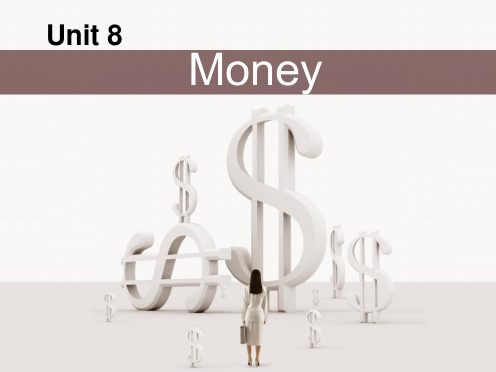
shells
copper money in the shape of knives, jade and spinning wheels
cash-free: credit cards
paper notes and coins
Proverbs and Sayings
◎ Money is the root of all evil.金钱是罪恶的根源。 ◎ Money makes the mare go. 有钱能使鬼推磨。 ◎ A fool and his money are soon parted. 蠢人不积财。 ◎ Take care of the pence and the pounds will take care of themselves.积少成多。 ◎ Tight one’s belt. 勒紧裤腰带。 ◎ Be in the hole. 亏空。 ◎ Pinch pennies 精打细算 ◎ Pay through the nose 花大价钱 ◎ Spend money like water. 挥金如土。 ◎ Make both ends meet.收支相抵。 ◎ All is not gold that glitters.闪光未必尽是黄金。
Money might be the root of all evil if we value it too much. (Para. 12-15)
For example: The couple in “Elias” lived a happier
life when they became poor and lived a simple life. Conclusion. (Para. 16-17)
Video Clip
unit 3 Money Matters

《应用型大学英语——视听说》教案单元名称:Unit 3 Money Matters单元话题:Money MattersPart One: Purpose of TeachingIn this unit, we will learn the functions of money and its special role in daily life. We will learn how to use money properly and bargain with people. We will learn some useful expressions in meetings and learn how to host a meeting and express ideas in the meeting. Oral activities in different forms will be conducted to practice these language skills.Part Two: Time ArrangementPart Three: Teaching ContentsⅠLead-in (10 minutes)⏹Teachers are expected to make the students have a discussion about moneymatters, the functions of money in our daily life as well as the ways people spend money.⏹Lead the students to get familiar with the names of money in different countries.Culture LinkActivity 1 Listening⏹Teachers let the students listen to the passage from the beginning to the end onceto see to what extent that the students can take the notes of the questions.⏹Then let the students listen to the tape again and leave enough span of pause,making the students take down the answers.Activity 2 ViewingWord Bank⏹Direct students to read questions first and predict what they are going to hear.⏹Play the recording.⏹The teachers are expected to play the video three times and guide the students tograsp the main points in the passage according to the questions.⏹Check answers and explain.ⅡCommunication Skills (20 minutes)Activity 1 Oral Functions⏹Go over the listed expressions one by one.⏹Lead the class to read these expressions, and try to find more expressions for ameeting.Activity 2 Oral PracticeTask 1 Listening⏹Teachers let the students listen to the passage from the beginning to the end onceto see to what extent that the students can take the notes of the questions.⏹Then let the students listen to the tape again and leave enough span of pause,making the students take down the answers.Task 2 Viewing⏹The teachers are expected to play the video three times and guide the students tograsp the main points in the dialogue according to the questions.⏹Ask the students to pay attention to the numbers.⏹Check answers.Task 3 Speaking⏹Allow enough time for students to work in pairs.⏹Invite volunteer pairs to show their dialogue to the whole class.⏹Encourage students’ progress in oral practice.⏹Discuss some other topics together.ⅢIn-putting & Out-putting (30 minutes)Activity 1 Listening to learn⏹Teachers let the students listen to the passage from the beginning to the end onceto see to what extent that the students can take the notes of the questions and do the true or false questions.⏹Then let the students listen to the tape again and leave enough span of pause,making the students take down the answers and finish the choices.Task 2 Listening for details⏹Play the recording once again.⏹Check answers.Word BankActivity 2 Viewing to learn⏹Direct students to check those familiar words and expressions. Encourage them totell something about thanksgiving day.Task 1 Viewing for information⏹Play the video and check answers.Task 2 Viewing for details⏹The teachers are expected to play the video three times and guide the students tograsp the main points in the passage according to the questions.⏹For the first and second time guide the students to finish task one and task two.For the third time check the answers with them.ⅣFollow-up Activities (15 minutes)Activity 1 Listening to LearnTask 1 Listening for information⏹Have students read questions first and play the recording.⏹Check answers.Activity 2 Viewing for informationTask 1 Viewing for Information⏹Play the video and check answers.Part Four: Oral Practice (10 minutes)Oral practices listed as follows are optional.Part 1 Activity 3 Speaking⏹Teachers are expected to require the students to work in pairs, and then ask one ortwo groups to present their own discussions according to the questions in the form.⏹Ask for students to survey to see how many students share the same opinion. Part 3 Activity 1 Task 3 Oral Practice⏹Ask the students to Work in groups of three to four, and fill in the followingquestionnaire.⏹Then report the result to the whole class.Part 3 Activity 2 Task 3 Oral Practice⏹Direct students to understand the back ground information about economic crisis.⏹Make student work in pairs. Discuss the reasons, suggestions to solve theproblem of economic crisis.Part 4 Activity 1 Task 2 Oral Practice⏹Allow enough time for students to work in pairs.⏹Invite volunteer pairs to show their dialogue to the whole class.⏹Encourage students to progress in oral practice.⏹Discuss some other topics together.Part 4 Activity 2 Task 2 Oral Practice⏹Allow enough time for students to have a discussion with their partners.⏹Each group should nominate a group leader to gather facts and proofs fortheir debate.⏹The teacher walks around to offer any necessary help to each group.Part 5 Entertainment⏹Challenge your knowledge!1) Ask the students to find the meanings of the idioms.2) Group the students and let them give the examples of the usages of the idioms.3) Ask the students to find more idioms about money, and explain the meanings and usages to the classmates.Part Five: Assignment1) Choose one of the oral practices in Part Four and have students prepare for it afterclass.2) Practice some other topics about money, and further the discussion of how to use and save money.Review Checklist(5 minutes)●Have students finish the checklist in class or after school.。
Unit 8 Money

Money may not be the root of all evil,
But it often brings us anguish(苦恼)and regrets.
Now I would like to tell you how to
solve the problem, my dear friends.
is not everything, and sometimes it is
nothiWatching
Video Watching
Script
Today, nearly 144 million Americans have credit cards, and they are using their cards like never before, charging 1.5 trillion dollars last year alone. Credit cards have become an essential part of the American economy. I really can say that I love my credit, but I would hate to live without it. I use it a lot for work, it’s easy, it’s easy access. I can take clients out for dinner. I take advantage of the miles, we fly first-class on vacations. It’s nice ~ this ~ what you don’t have. Can you image living without of credit card in the society? It’s hard to imagine. We sit down with the group of credit card customers to talk about how they use their cards.
- 1、下载文档前请自行甄别文档内容的完整性,平台不提供额外的编辑、内容补充、找答案等附加服务。
- 2、"仅部分预览"的文档,不可在线预览部分如存在完整性等问题,可反馈申请退款(可完整预览的文档不适用该条件!)。
- 3、如文档侵犯您的权益,请联系客服反馈,我们会尽快为您处理(人工客服工作时间:9:00-18:30)。
Unit 8 Money Matters
Teaching Objectives
1)To talk about shopping hobbies and money-making ideas;
2)To practice students’ global and detailed listening skill;
3)To make students learn about a listening skill — Note-taking: using a table to organize notes.
4)To buy things in shop;
5)Discuss which profession should get the highest/ lowest pay.
Teaching Focus
1. To offer students chance to imitate native English speakers;
2. To make students practice buying and selling things in shops;
Teaching method
1.Learner-centered approach.
2.Interactive learningapproach;
municative approach;
4.Group learning approach
Teaching Procedure
Step 1: Opening up
1.The teacher tells students they’ll play a cultural game in pairs and ask them every two
students form a pair. (2 minutes)
2.There are two tasks in this activity.
3.Task 1 Naming your shops and stores (See Worksheet-1)
4.Task 2 Defining your shops and stores (See Worksheet-2)
5.The teacher distributes Worksheet-1 to each pair and asks them to finish task 1. (5 minutes)
6.The teacher checks their answers and provides feedback. (5 minutes)
7.The teacher distributes Worksheet-2 to each pair and asks them to finish task 2. (10 minutes)
8.The teacher asks some students to explain their definition in class and then the teacher
provides feedback. (8 minutes)
Step 2: Listening to the world
1. Sharing
Listen and finish the listening tasks.
2. Listening
Students read the tips and practice the listening skill—Note-taking: using a table to organize notes.
3. Viewing
Students read the program which introduces Google.
Step 3: Speaking for communication
1. Imitation
Listen and imitate.
2. Speaking activity
1) The teacher guides students to learn the Speaking skills — buying things in shops on P137. (10 minutes)
2) The teacher distributes the chess maps and the shopping lists to each pair and asks them to play the chess with their dice. Each one has a shopping list and their task is trying to finish their buying task on the map. They play the dice in turns and go on the map. They will not stop playing it until either of them finishes his / her shopping task. (20 minutes)
4) The teacher gives the feedback. (10 minutes)
Step 4:
Listen and finish the task
Assignment: Further practice in listening
1. short conversations
2. long conversations
3. passage 1
4.passage 2。
